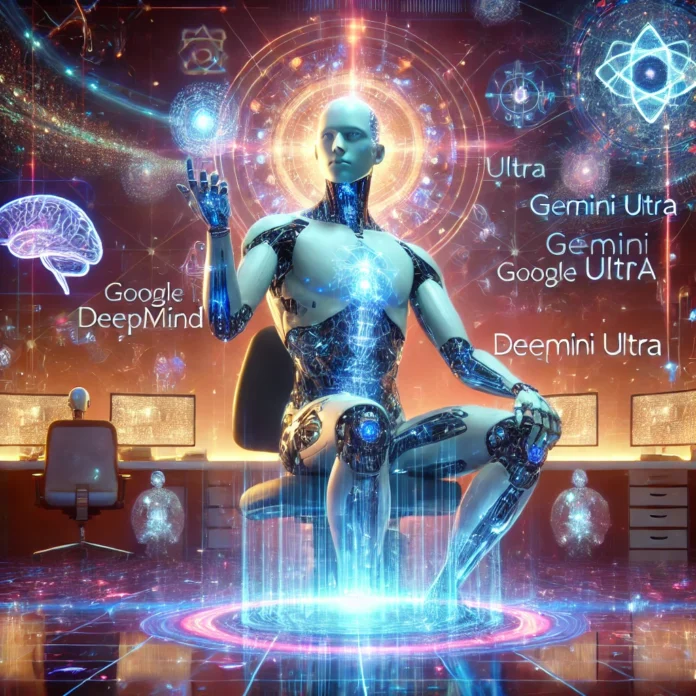Google DeepMind researchers have announced a significant breakthrough in artificial intelligence development: Gemini Ultra has demonstrated unprecedented self-improvement capabilities through a novel technique called «AI feedback distillation.» This advancement represents a notable step toward artificial general intelligence (AGI) and could dramatically accelerate AI progress across numerous domains.
The Breakthrough Explained
In findings published yesterday in the scientific journal Nature, DeepMind researchers revealed that their most advanced large language model, Gemini Ultra, can now effectively critique its own outputs, identify weaknesses, and incorporate these insights into improved versions of itself without direct human intervention.
«What makes this achievement particularly remarkable is that the model generates its own training data through an iterative feedback loop,» explained Dr. Maria Chen, lead researcher on the project. «The system can essentially teach itself to become better at complex reasoning tasks.»
The technique, called AI feedback distillation (AIFD), works by having one instance of the model evaluate outputs from another instance, generating detailed critiques and suggestions for improvement. These critiques are then used to train subsequent versions of the model, creating a self-reinforcing cycle of enhancement.
Performance Improvements
According to DeepMind’s technical paper, models trained with AIFD have demonstrated:
- 27% improvement in mathematical problem-solving capabilities
- 31% enhancement in scientific reasoning
- 19% increase in coding efficiency
- Significant reduction in hallucinations and factual errors
«We’ve observed performance gains across all benchmarks that would have traditionally required months of additional training and human feedback,» noted Dr. James Wilson, DeepMind’s Director of Research. «The model’s ability to identify its own weaknesses has proven more effective than human evaluators in many scenarios.»
Industry Implications
This development arrives at a pivotal moment in the AI industry, as competition between leading AI labs intensifies. Just last week, Anthropic announced its Claude 3.7 model with enhanced reasoning capabilities, while OpenAI has been rumored to be working on GPT-5 with improved multimodal features.
Industry analysts suggest this breakthrough could give Google significant advantages in the increasingly competitive AI race.
«DeepMind’s self-improvement technique could potentially reduce the resources needed for training advanced models by an order of magnitude,» said analyst Sarah Rodriguez of Tech Futures Research. «This efficiency gain could translate to faster development cycles and more rapid deployment of increasingly capable AI systems.»
Ethical Considerations and Safety Measures
The development has also raised concerns among AI safety experts. The ability for AI systems to self-improve without human oversight represents a potential inflection point that some have long warned about.
DeepMind emphasizes that numerous safety measures have been implemented, including human oversight of the distillation process, automatic shutdown mechanisms if the system begins exploring unsafe directions, and continuous monitoring for emergent behaviors.
«We’ve designed multiple layers of safeguards,» said Dr. Emma Thompson, DeepMind’s Head of AI Safety. «The self-improvement remains bounded within parameters we’ve established, and humans remain in the loop at critical junctures.»
Industry Responses
The announcement has prompted responses from other major AI labs:
- Anthropic CEO Dario Amodei called the development «impressive but concerning,» emphasizing the need for industry-wide safety standards for self-improving systems.
- OpenAI’s Sam Altman tweeted: «Congratulations to the DeepMind team. This represents exactly the kind of research frontier where cooperation on safety is essential.»
- Microsoft’s AI division announced plans to incorporate similar techniques into their future models while prioritizing «responsible innovation.»
Future Applications
DeepMind researchers suggest that self-improving AI could accelerate breakthroughs in fields ranging from drug discovery to climate science. The paper outlines potential applications in scientific research where the model could propose hypotheses, design experiments, analyze results, and refine its approach autonomously.
«We’re particularly excited about applications in healthcare and scientific discovery,» Dr. Chen added. «A system that can continuously improve its understanding of complex biological processes could help identify novel treatments for diseases or optimize existing protocols.»
What’s Next
While the current implementation remains in a research environment, DeepMind plans to gradually incorporate aspects of AIFD into commercial products following extensive safety testing and ethical review.
The research team has published their methodology with certain technical details withheld pending security reviews, a practice increasingly common among leading AI labs concerned about potential misuse of advanced techniques.
For the AI community, this development marks another milestone in the rapidly accelerating field and intensifies discussions around AI governance, safety protocols, and the trajectory toward increasingly autonomous systems.




